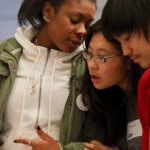What Happens Once a Student Reaches Proficiency?
CompetencyWorks Blog

During my travels in Maine last fall to three districts in the Maine Cohort for Customized Learning that are well on their way to fully implementing competency education, an interesting question popped up during conversations with students: What happens once a student reaches proficiency? As I talked to students, they all had different responses to how they used the time that is built into the school day (reading The Learning Edge for more information about how districts are embedding support time):
Faster: Amidst a gaggle of 7th grade boys, one student clearly liked to power ahead in math. He emphasized it was only in math (his father was a math teacher) and that he was at “teacher-pace” in his other courses. If he had extra time in the class or in the day he would work on his math. Once he reached proficiency (usually described as a 3 or above), he would move on to the next unit as the learning targets, curriculum modules, and resources were available online.
Better: In a conversation at a high school, two young women, self-described best friends, discussed how they have a competition among themselves. They aim to get “4’s” on all assessments, in all classes, all the times. If they have extra time in the day they work on whatever topics they needed to in order to demonstrate the application of their learning beyond what was taught in the classroom to their teacher.
Passion: One young man, showing the slumped body language of disengagement, simply said that he does the minimum as he isn’t interested in school. He aims for a 3 at teacher-pace. With his art notebook always at his side, he uses an extra time to do the one thing he really likes – drawing.
Fun: A quiet young woman told me that it was doing the work to get a 4 that was the fun part of school. She felt that she could be creative, explore something new, apply the learning in a way that was meaningful to her. From what I can tell, the option of a 4 was a door to the joy of learning. (Check out the video The Box to see what this can mean for students).
What was remarkable about this is that there wasn’t a school policy about what students were expected to do. This was a student-centered policy that creates space for students to choose how to use their time during the day in pursuit of learning.
What fascinates me is the implications of this learning-space for student choice could be for other policies. How do competitive colleges think about comparing a student that completed high school by age 16 proficient in all their courses and has a full year of college courses on their transcript with a student that consistently went beyond the expectations of their courses, yet taking 4 full years to complete everything? How do we evaluate teachers that inspire students to drive for excellence as compared to those that encourage students to explore interests and develop passion for topics and domains that can guide their future choices? And I can’t even get my head wrapped around the implications for performance-based funding.
For those of you interested in understanding grading policies, there is another related question — What does a 4 really mean? How we define what it means to exceed proficiency is likely to have implications for how students think about their choices and how we create opportunities for students to explore their passions while also driving for excellence. Here are a few examples of how districts and schools are describing what it means to exceed proficiency:
- Sanborn Regional School District, NH: The student consistently exceeds the performance standards for the grade level. The student with relative ease, grasps, applies, generalizes, and extends key concepts, processes, and skills consistently and independently.
- Spaulding High School, NH: Effectively synthesizes, analyzes, evaluates and reformulates content knowledge and skills (e.g. creative, novel, multiple approaches)
- RSU 2, Maine: All the foundational knowledge and skills, all the complex knowledge and skills; goes beyond what was taught in class to apply the knowledge.
Just think about it in terms of our pursuit of college and career readiness for all students. If a student reaches a 3 in all courses will that make them college and career ready for entrance into community college without remediation? If they get all 4’s does that position them for competitive college admissions processes? We know the GPA tells us a lot about how well a student will do at college — what we don’t know is whether there will be a difference between a 3 and a 4. It’s possible that students that power on are going to be equally as likely to succeed in college as those that exceed expectations. Numerical ranking may just not have the power it has in the time-based system.